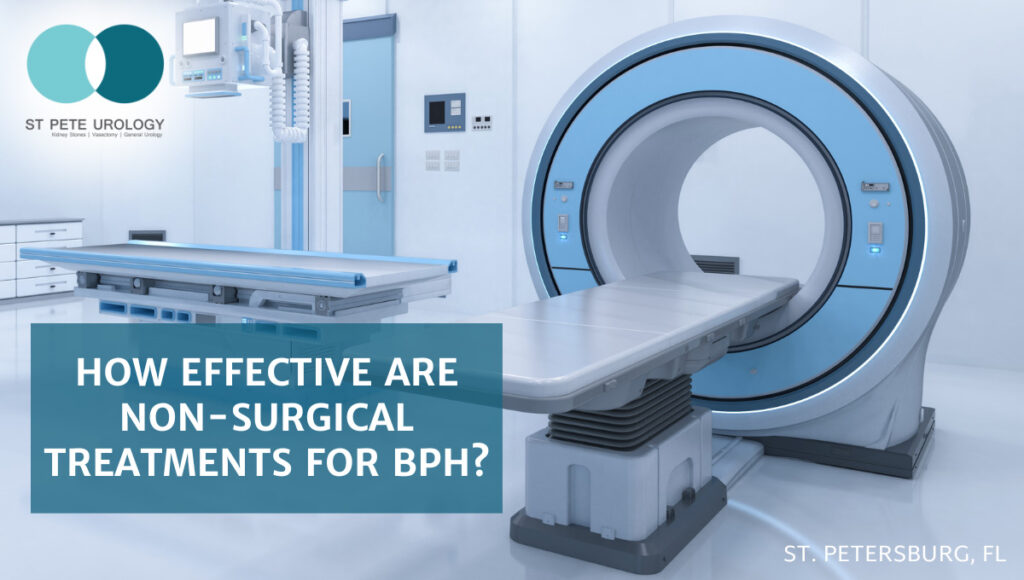Key Takeaways:
- An enlarged prostate isn’t always indicative of BPH and other conditions, medications, and lifestyle factors can contribute to prostate enlargement.
- Diagnosing BPH isn’t a simple tick-box exercise and a variety of tests may be used to confirm or rule it out.
- If you’re facing symptoms that suggest an enlarged prostate, don’t hesitate to seek expert medical advice.
You may be familiar with the prostate – a small, walnut-sized gland playing a critical role in the male reproductive system. Primarily responsible for the production of seminal fluid, it’s an organ that is often overlooked until something goes wrong, such as the development of Benign Prostatic Hyperplasia or BPH.
What Does an Enlarged Prostate Mean?


An enlarged prostate is exactly what it sounds like: the gland has grown in size. But why? Several factors, including age and hormone levels, can contribute to this enlargement. But does an enlarged prostate automatically equate to BPH?
Unpacking BPH
BPH is a common condition characterized by an enlarged prostate, but not all instances of prostate enlargement signify its presence. BPH symptoms can involve frequent urination, difficulty starting and stopping urination, and feeling as though your bladder isn’t entirely emptied.
The Other Suspects: Beyond BPH
Prostatitis, inflammation of the prostate, or prostate cancer could also be behind your enlarged prostate. Certain medications, too, can induce prostate enlargement as a side effect. You see, diagnosing BPH isn’t a simple tick-box exercise.
The Art of Distinguishing an Enlarged Prostate from BPH
Your urologist will conduct several diagnostic tests to confirm or rule out BPH. This could include a digital rectal examination, urinalysis, or a prostate-specific antigen test. It’s through understanding these results and your symptoms that BPH can be differentiated from other conditions.
Facing BPH: Your Treatment Options
Should BPH be confirmed, a variety of treatment options are available, from lifestyle changes like reducing fluid intake before bedtime to medication. Minimally invasive procedures are often explored before surgical interventions are considered.
The Uncertainty: When an Enlarged Prostate may not Indicate BPH
If your prostate tests show enlargement, but your symptoms don’t match BPH, your urologist may delve deeper into other potential causes. This could involve further tests and evaluations to rule out serious conditions like prostate cancer.
Conclusion: Key Points and the Path Forward
An enlarged prostate isn’t always indicative of BPH, and true symptom relief depends on identifying the correct underlying issue. Other conditions, medications, and even lifestyle factors can contribute to prostate enlargement. Recognizing this is the first step towards relief.
If you’re facing symptoms that suggest an enlarged prostate, don’t hesitate to seek expert medical advice. In St Petersburg, FL, St Pete Urology offers a dedicated team of experienced urologists determined to diagnose accurately and treat effectively, ensuring your prostate health is in the right hands. So, don’t let worries about your prostate keep you up at night, reach out to St Pete Urology, and take control of your health today.
References:
- St Pete Urology. (2013, March 11). What is Prostate Enlargement? St Pete Urology. https://stpeteurology.com/what-is-prostate-enlargement/
- St Pete Urology. (2018, June 13). Prostate Enlargement BPH. St Pete Urology. https://stpeteurology.com/prostate-enlargement-bph/
- And, D. (2023, September 18). Prostate Enlargement (Benign Prostatic Hyperplasia). National Institute of Diabetes and Digestive and Kidney Diseases; NIDDK – National Institute of Diabetes and Digestive and Kidney Diseases. https://www.niddk.nih.gov/health-information/urologic-diseases/prostate-problems/prostate-enlargement-benign-prostatic-hyperplasia
- NHS Choices. (2023). Overview – Benign prostate enlargement. https://www.nhs.uk/conditions/prostate-enlargement/
- Prostate-Specific Antigen (PSA) Test. (2022, March 11). National Cancer Institute; Cancer.gov. https://www.cancer.gov/types/prostate/psa-fact-sheet




